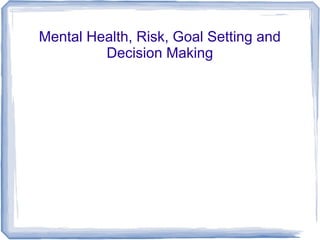Report
Share

Recommended
Recommended
More Related Content
Similar to Mental health.ppt unit 1 and 2
Similar to Mental health.ppt unit 1 and 2 (20)
Written Case Analysis ModelStep 1. Problem Identification. The f.docx

Written Case Analysis ModelStep 1. Problem Identification. The f.docx
Mental health.ppt unit 1 and 2
- 1. Mental Health, Risk, Goal Setting and Decision Making
- 2. Many Factors Mental health is affected by many factors. Environment, other people, physical health, etc.
- 3. Health Triangle Each part influences another. Your goal is to have all sides of the triangle equal. The triangle is on the next slide.
- 5. Self- Concept How much you value and respect your self. It is your confidence and how you feel about yourself.
- 6. Risk Everything has risk. Risk in many situations is not bad, you stand a chance of being unsuccessful rather than succeeding. In health, risk is viewed a little differently. Your success would be good health, failures harm your health. When looking at a situation there are some things to keep in mind......
- 7. Things to keep in mind Risk Behaviors- Are actions that potentially threaten health. (example: smoking) Cumulative Risks- In some situations, doing one thing can increase the risk somewhere else. So the risk increases in effect with each added risk. (example: drinking and then doing something else potentially harmful because your judgement was impaired) Prevention- Taking steps to keep something from happening. (example: having a designated driver) Abstinence- Deliberate decision to avoid high risk behaviors. (example: not going to a party where drugs are present)
- 8. A little more on prevention Prevention can be any action to reduce a risk. It can be as simple as eating healthy to avoid diabetes or wearing a seat belt when driving. It doesn't remove the risk, it just lessens the chance of harm.
- 9. Decision Making Good decision making can reduce risk. There are steps to the process.
- 10. Decision Making Process State the situation. Basically, identify to problem or objective. List possible choices. What can you do? Make the decision and act. Weigh your options. Decide on the best one and do it. Evaluate your decision. Was it a good choice? If you don't evaluate you won't learn from mistakes and will continue to repeat them. Success is also important. If something works, you know you should do it again. Evaluating also helps you to make improvements on your successes as well.
- 11. Goal A goal is a result that a person aims for that takes planning and work. There are short term and long term goals. A short term goal is a goal that can be reached quickly..passing a test, completing all of your homework during a week are good examples of short term goals for a high school student. A long term goal will take a little longer to achieve, there may be several short term goals set in order to reach the long term goal. (going to college, playing a professional sport, graduating from high school)
- 12. Goal Setting Once you set a goal you must develop an action plan, which are specific steps that will help you reach your goal. It can be compared to a road map or a recipe. These are the steps you will need to reach the goal(s) that you have want to reach.